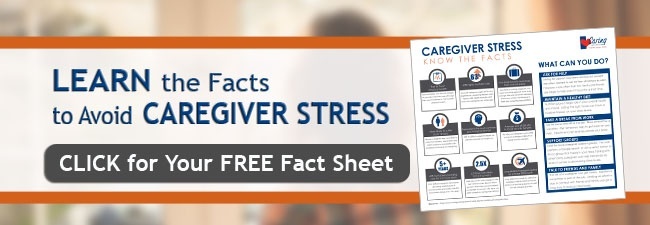Caring for someone else — professionally or not — can significantly impact your life. As you focus on someone else, you may forget your own needs. But you can also feel extremely fulfilled. Caregiving can have both positive and negative effects on your overall health, highlighting the importance of finding balance as you care for others. Let’s discover the impact caregiving can have on your health.
Positive Health Effects
Despite the challenges that you might face as a professional or family caregiver, many caregivers enjoy taking care of others and find it extremely fulfilling. In fact, over 80% of caregivers view their experiences as positive. Here are some of the health benefits associated with caregiving.
Strength & Stamina
You might not think about caregiving as a workout, but it can be! As you assist individuals with activities of daily living (ADLs), you move around quite a bit. You might have to help someone get out of bed or walk to the dining room. Much of your day could be spent on your feet. But all of these actions can help build your muscle strength and endurance — unlike friends who may be sitting at a desk all day. Movement and exercise is also linked to a number of other health benefits, like lower blood pressure, reduced risk for heart conditions, etc.
Improve Mood
It has been shown that helping others makes us happy. In fact, research shows that helping others releases endorphins, which are the chemicals in the brain that promote feelings of well-being. It’s the same chemical that refers to “runner’s high” in athletes. But in the caregiving space, it is known as “helper’s high.” These endorphins can help you feel good, reduce stress, and improve your mood.
Boost Self-Esteem
There’s something truly fulfilling about assisting someone else and helping them improve their quality of life. As you care for others and see the difference you make, you can increase your self-esteem. And this is also proven through brain chemistry! Caregiving can help give you purpose and identity, helping you define who you are. Plus, caregiving is a social activity. As you build meaningful relationships with those you care for, you can deepen your own self-worth.
RELATED CONTENT: 7 Reasons Why Caregiving is More Than Just a Job
Reduce Loneliness
Loneliness can lead to isolation and depression, which can take a toll on your health mentally and physically. However, caregiving requires that you are around other individuals and that you socialize with them. While the level of socialization may vary depending on the abilities and cognitive awareness of the person you care for, you can still enjoy the health benefits that come from being around others and increase your own quality of life. Plus, socialization is also linked to reduced risk of Alzheimer’s disease and lower blood pressure.
Negative Health Effects
Although caring for someone else can be extremely rewarding, there are several negative health effects as well. Being a caregiver can be time-consuming and demand a lot from you mentally, physically, and emotionally. In fact, 53% of caregivers report a decline in their health as a result of caring for someone else.
Physical Injury
As you care for someone else, you may have to perform tasks that require physical strength, like transferring someone from their bed to a wheelchair. While there are proper techniques to help you remain safe, there is always the chance that you get injured. You could fall, strain a muscle, break a bone, etc. After suffering from a physical injury, you may need to take a break from caregiving so that you can properly recover.
Stress & Anxiety
Because caregiving requires a lot of your time and energy, it can become exhausting to the point that you experience a decline in your mental health. This is often referred to as caregiver stress and burnout. As you care for individuals with behavior issues or significant care needs — like seniors with dementia — you can be at higher risk of caregiver stress.
This state of high stress can lead to:
- Headaches or migraines
- Muscle aches and pains
- Poor diet
- Lack of sleep
- High blood pressure
If left unaddressed, caregiver stress can also lead to depression and other forms of mental illness. Recently, 1 in 3 caregivers reported that they have seriously considered suicide within the past month. So, while caregiving can be rewarding, it can also be extremely draining. You must regularly check your mental health to see how you are doing, and if you need a break, take one!
RELATED CONTENT: How to Avoid Caregiver Burnout and Stress
Obesity
Compared to the rest of the population, obesity is twice as prevalent in caregivers. This could be due to caregivers turning to food as a coping mechanism for the stress of their job. Many caregivers might also not eat at regular intervals throughout the day since they are caring for someone else, which can affect your metabolism. Obesity is linked to higher risk of diabetes, heart disease, stroke, high blood pressure, and even death.
Finding the Right Balance
As you care for someone else, it’s important that you find the right balance between caring for them and caring for yourself. This will help you maximize the positive health effects of caregiving while minimizing the negative effects.
If you need to recharge so that you can better care for someone else, reach out to a Caring Senior Service team near you. We provide respite care and can step in while you focus on you. We take care of individuals as if they were our own family, so you can have peace of mind while you get a break.
Learn more about the physical effects of caregiving in our Caregiver Stress Fact Sheet.


